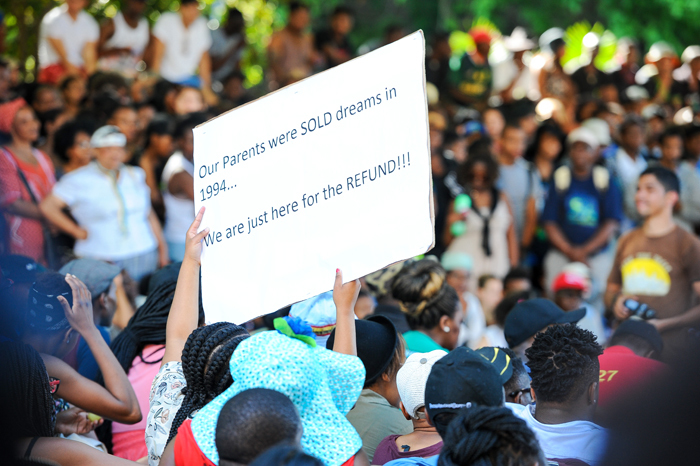International journal focuses on South African student uprising
15 February 2016 | Story Newsroom. Photo Roger Sedres.
The student uprising in South Africa in 2015 is the subject of the latest edition of the international journal, Arts and Humanities in Higher Education, which has been co-edited by UCT's Professor John Higgins, Arderne Chair of Literature, and Peter Vale, director of the Johannesburg Institute of Advanced Study.
Titled 'State of Urgency', the international journal Arts and Humanities in Higher Education (Volume 15 Number 1 (2016)) features work from contributors at UCT and across the country who take a closer look at what lies behind the current wave of student protests.
This South African edition is the first scholarly attempt to offer an in-depth account of the animating concerns at work within the recent student protest movement, according to co-editor Professor John Higgins, Arderne Chair of Literature at UCT.
Higgins, who has since been invited to join the editorial board of the journal, co-edited this edition with Peter Vale, director of the Johannesburg Institute of Advanced Study.
'State of Urgency' features work from contributors at UCT and across the country, among them artist William Kentridge, novelist and former UCT vice-chancellor Njabulo Ndebele and social anthropologist Achille Mbembe.
Says Higgins: “What we are witnessing, just over 20 years after the formal dismantling of apartheid that was embodied in the adoption of South Africa's new Constitution in 1994, is a living on of the past, a startled recognition that the past is not even past.”
Setting the scene
According to Higgins, three essays in the journal set the scene from different vantage points:
Kentridge tries to capture the mood of the present generation of students. These, he suggests, are finishing their degrees “as our country is in the middle of a massive hangover”. “The democracy party”, he puns, “is long finished, but everybody is left with a headache and a foul temper”, but, despite the inevitable hangover blues, there remains “still much to undo, and even more to do”.
Ndebele, puts his finger on the sore point of much current concern, writing how “I and my generation were without choice educated in a schooling environment that in its content orientated us away intellectually from our formative environments of home and community”. This resulted in dangerously high levels of alienation as “our affective imaginations progressively got anchored elsewhere”, with the inevitable consequence that “our own immediate world” became “less real”. On the political level, Ndebele suggests, in a provocative analysis of the growing and visible corruption of the new ruling classes, “where there may have once been the inner pain of self-degradation, there is now an inner sense of entitlement”.
Meanwhile, social theorist Achille Mbembe, replying specifically to the #RhodesMustFall movement, poses the central political dilemma, noting how “[m]any still consider whites as 'settlers' who, once in a while, will attempt to masquerade as 'natives'”. Yet, he urges, “with the advent of democracy and the new constitutional state, there are no longer settlers or natives. There are only citizens. If we repudiate democracy, what will we replace it with?”.
Read more about State of Urgency: The Humanities in South Africa
 This work is licensed under a Creative Commons Attribution-NoDerivatives 4.0 International License.
This work is licensed under a Creative Commons Attribution-NoDerivatives 4.0 International License.
Please view the republishing articles page for more information.










